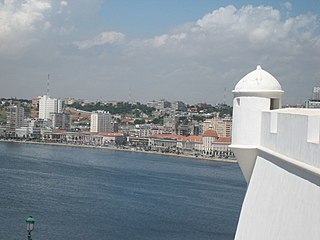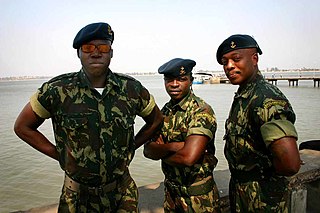
The United Nations Operations in Mozambique was a UN peace mission to Mozambique established in December 1992 under Security Council Resolution 797 with the assignment to monitor the implementation of the Rome General Peace Accords agreed upon by the Mozambican president Joaquim Chissano of FRELIMO, the Front for Liberation of Mozambique, and Afonso Dhlakama of RENAMO, the Mozambican National Resistance. The operation was one of the most significant and extensive UN operations and it sought to demobilize and disarm troops, provide humanitarian aid, and oversee the elections. The operation ended in December 1994.

United Nations Security Council resolution 782, adopted unanimously on 13 October 1992, after welcoming the Rome General Peace Accords signed on 4 October 1992, in Rome between the FRELIMO (government) and RENAMO (rebel) parties in the Mozambican Civil War, the council approved the appointment of an interim Special Representative and the deployment of up to 25 military observers to Mozambique. The Special Representative was an Italian, Aldo Ajello.

United Nations Security Council resolution 793, adopted unanimously on 30 November 1992, after recalling resolutions 696 (1991), 747 (1992) and 785 (1992), and expressing its concern at the deteriorating political situation and the resumption of hostilities in Angola, the Council approved a recommendation by the Secretary-General Boutros Boutros-Ghali to extend the mandate of the United Nations Angola Verification Mission II for a further two months until 31 January 1993.

United Nations Security Council resolution 797, adopted unanimously on 16 December 1992, after reaffirming Resolution 782 (1992), the Council decided to establish the United Nations Operation in Mozambique (ONUMOZ) as proposed by the Secretary-General Boutros Boutros-Ghali in line with the peace agreement for Mozambique.

United Nations Security Council resolution 804, adopted unanimously on 29 January 1993, after reaffirming resolutions 696 (1991), 747 (1992), 785 (1992) and 793 (1992), and expressing its concern at lack of implementation of the "Acordos de Paz para Angola" in Angola, the council approved a recommendation by the Secretary-General Boutros Boutros-Ghali to extend the mandate of the United Nations Angola Verification Mission II for a further three months until 30 April 1993.

United Nations Security Council resolution 818, adopted unanimously on 14 April 1993, after reaffirming resolutions 782 (1992) and 797 (1992) on the situation in Mozambique, the Council stressed its concern regarding the delays and difficulties affecting the implementation of the peace process envisaged in the Rome General Peace Accords during the Mozambican Civil War.

United Nations Security Council resolution 850, adopted unanimously on 9 July 1993, after reaffirming resolutions 782 (1992), 797 (1992) and 818 (1993) on the situation in Mozambique, the Council discussed the implementation of the Rome General Peace Accords and the formation of a new armed forces in the country.

United Nations Security Council resolution 863, adopted unanimously on 13 September 1993, after reaffirming resolutions 782 (1992), 797 (1992), 818 (1993) and 850 (1993) on the situation in Mozambique, the council discussed the implementation of the Rome General Peace Accords.

United Nations Security Council resolution 866, adopted unanimously on 22 September 1993, after reaffirming resolutions 813 (1993) and 856 (1993), the council noted that United Nations involvement would contribute significantly to the effective implementation of the peace agreement in Liberia and went on to establish the United Nations Observer Mission in Liberia (UNOMIL).

United Nations Security Council resolution 872, adopted unanimously on 5 October 1993, after reaffirming resolutions 812 (1993) and 846 (1993) on the situation in Rwanda and Resolution 868 (1993) on the security of United Nations operations, the council stressed the need for an international force in the country and therefore established the United Nations Assistance Mission for Rwanda (UNAMIR).

United Nations Security Council resolution 888, adopted unanimously on 30 November 1993, after recalling resolutions 637 (1989), 693 (1991), 714 (1991), 729 (1992), 784 (1992), 791 (1992) and 832 (1993), the council expressed concern at aspects of the situation in El Salvador and extended the mandate of the United Nations Observer Mission in El Salvador (ONUSAL) until 31 May 1994.

United Nations Security Council resolution 898, adopted unanimously on 23 February 1994, after reaffirming Resolution 782 (1992) and all subsequent resolutions on Mozambique, the Council discussed the implementation of the Rome General Peace Accords and established a 1,144 strong police component of the United Nations Operation in Mozambique (ONUMOZ).
United Nations Security Council resolution 916, adopted unanimously on 5 May 1994, after reaffirming Resolution 782 (1992) and all subsequent resolutions on Mozambique, the council decided to renew the mandate of the United Nations Operation in Mozambique (ONUMOZ) for a final period ending 15 November 1994, and discussed the implementation of the Rome General Peace Accords.
United Nations Security Council resolution 920, adopted unanimously on 26 May 1994, after recalling resolutions 637 (1989), 693 (1991), 714 (1991), 729 (1992), 784 (1992), 791 (1992), 832 (1993), 888 (1993), the council discussed the implementation of peace agreements in El Salvador and extended the mandate of the United Nations Observer Mission in El Salvador (ONUSAL) until 30 November 1994.

United Nations Security Council resolution 957, adopted unanimously on 15 November 1994, after reaffirming Resolution 782 (1992) and all subsequent resolutions on Mozambique, the Council welcomed the recent elections on 27–29 October 1994 in accordance with the Rome General Peace Accords and extended the mandate of the United Nations Operation in Mozambique (ONUMOZ) until a new government took office, but no later than 15 December 1994, with a full withdrawal by 31 January 1995.

United Nations Security Council resolution 960, adopted unanimously on 21 November 1994, after reaffirming Resolution 782 (1992) and all subsequent resolutions on Mozambique, the Council welcomed and endorsed the recent elections on 27–29 October 1994 in accordance with the Rome General Peace Accords, noting a declaration that they were free and fair by the Special Representative of the Secretary-General.

United Nations Security Council resolution 961 was adopted unanimously on 23 November 1994, after recalling resolutions 637 (1989), 693 (1991), 714 (1991), 729 (1992), 784 (1992), 791 (1992), 832 (1993), 888 (1993) and 920 (1994), the council discussed the implementation of peace agreements in El Salvador and extended the mandate of the United Nations Observer Mission in El Salvador (ONUSAL) for a final time until 30 April 1995.

United Nations Security Council resolution 981, adopted unanimously on 31 March 1995, after reaffirming all resolutions on the situation in the former Yugoslavia, the council established the United Nations Confidence Restoration Operation in Croatia (UNCRO) for a period terminating 30 November 1995.

United Nations Security Council resolution 1020, adopted unanimously on 10 November 1995, after recalling all resolutions on the situation in Liberia, particularly 1001 (1995), the Council discussed the implementation of the peace process during the First Liberian Civil War and adjusted the mandate of the United Nations Observer Mission in Liberia (UNOMIL) to include other functions.
The Maputo Accord, officially the Maputo Accord for Peace and National Reconciliation, is a peace agreement between the Government of Mozambique and Renamo, signed on 6 August 2019, with the aim of bringing definitive peace to Mozambique. The agreement was signed by the President of the Republic of Mozambique, Filipe Nyusi, and the leader of Renamo, Ossufo Momade, in Maputo, and was the result of years of negotiations. It was preceded by the signing of the Agreement on the Definitive Cessation of Military Hostilities, on 1 August 2019, in Gorongosa.
















